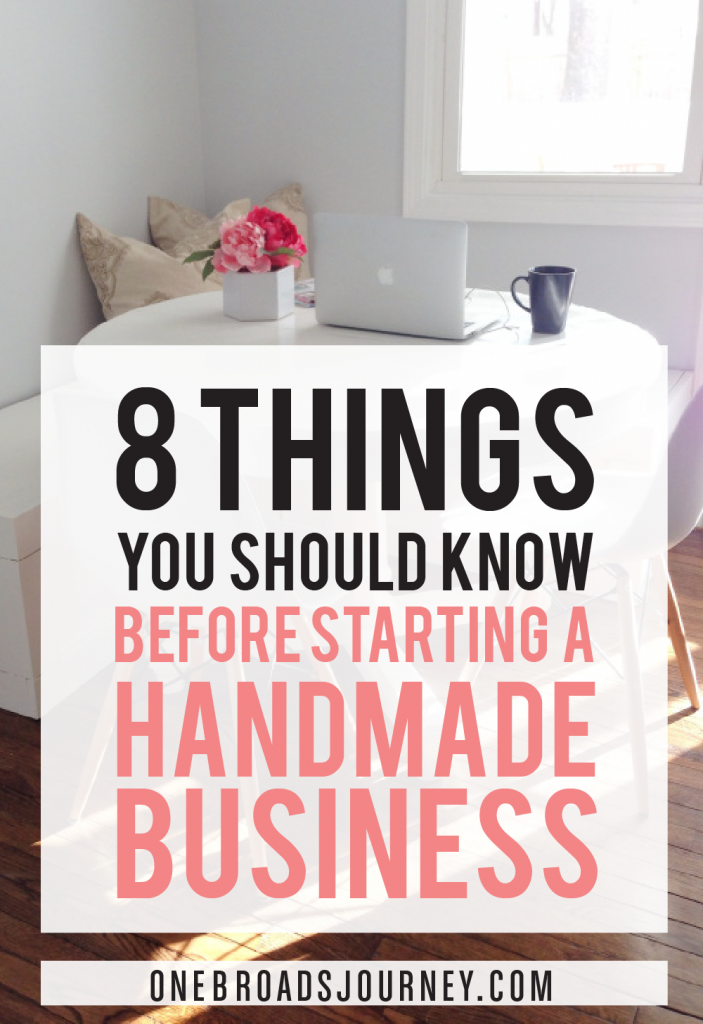Becoming an entrepreneur especially in the handcrafted world has never been more popular than it is today. People don’t want the mass produced China manufactured goods anymore. We’ve come full circle in society back to simplifying times and demanding responsibility for every product that enters our families lives and our homes. Consumers are craving that unique, personal touch to everything they buy. They want to know how it was made, where it came from, who it helps, and most importantly see the person who crafted it and the story behind why they did.
Starting a handmade business is a lot of hard work but with everyone wanting the next artisanal product for their home, it’s a great time to jump in. If you’ve ever considered taking your handcrafted goods from hobby to small business I highly encourage you to do so! But before you do, check out these important 8 things you should know before starting a handmade business.
1. Discipline
Working from home and starting your own business requires an immense amount of self-discipline in all aspects of your life.
Discipline in your schedule: The difference between working a few hours on your site then going out with friends vs staying in to create new products and update your site can be the difference between a successful and unsuccessful business. The time you put into your business will depend on the quality and success of your business. What you put in is what you’ll get out.
Discipline with your money: You will more than likely have to cut back on things like going out to eat, going to bars, getting your hair done professionally etc. in order to use that money toward starting up your company. Say you buy Starbucks 4 days a week. That’s roughly $80.00 a month. Take that savings over a year and it could be your next big materials order for your new product launch. These were the great ways I found to save money.
Discipline in your lifestyle: An important thing to remember when you decide to work from home is to still take care of yourself first. It’s really easy to start eating unhealthy because it’s fast and become obsessed with the progress you’re making that you forget to enjoy the weekends. You will not be able to put out your best work if you are not your best and healthiest self first.
2. Time Management
Ahhh time management. We’ve all got 48 hours of work to do and only 24 hours to do it. Creating a daily schedule is one of the best ways to have great time management. And back to #1 you have to actually stick to that schedule! Make sure to include personal activities, including time with family and friends throughout the week to keep your spirits high. Staying happy in your work week will show in the work you produce for your business. I use 3 different planners, one for social media and OBJ, one for Teluna and one for personal planning. I live and die by my 17 month planner. You should try it.
[Tweet “24 hours in a day and I have 48 hours of work to do #entrepreneur “]
3. Do Your Research
With most things in life, you need to put in the research time. Research best materials, manufacturers, shops, the need for your product, etc. If you’ve already made your product then your target customer is your research focus. You should know what kind of home your target customer lives in, their age range, do they have kids, how much money do they make, etc. It will change the way you advertise, who you market to, and so much more. You’ll be so happy you did the research because reaching those people are how you’re going to make sales.
You also need to research how to build an actual business. I researched for months before ever implementing any business strategies and that gave me the ability to build my company on my own in just 11 months. Research your target market, your business licenses, small business taxes, where you want to host your website (p.s. I use Shopify and they are amazing), will you participate in craft shows, do you want to eventually sell wholesale, etc. These are all things you need to be aware of going in.
Related Articles:
- How to start a blog on WordPress and make money
- How to build your online shop in minutes with Shopify
- How I Started A Company On My Own In 11months
- Earn extra money each month with Ebates plus a bonus
- 12 Best Online Survey Sites To Join For Extra Money
- Must Read Books For The Aspiring Entrepreneur And Girl Boss
- How I Earned My First $562.83 From Blogging
- 14 Ways To Have A Happier Workday When You Work From Home
4. Products
If you already have a product then great! Head back and reread number 3 for your next task. If you love crafting but not sure what you want to sell yet than I ask you to stop and take a moment to think about what people want and need. How will your product make a difference in their life? Why do they need your product above everyone else’s? Choose something you love to make and your truly good at making. You want your customers thinking “OMG that is exactly what I needed. They must have made that just for me!”
5. Pricing
Handmade businesses are typically created from the absolute love of a hobby that someone realized, wow I could totally sell these. When someone asks “can you make me one of those”, usually a friend or family member, typically our first thought is of course, no charge. As artists and crafters, we almost always price too low because I think we still see our craft as just a hobby. The first step is treating your craft like a business. You’ve decided to start selling it to make money after all.
When you’re pricing your products and your first thoughts are “We’ll it can’t be that much because it only took a few hours to make and I’ve been doing it for years. Plus I enjoy making it!” Stop right there. If you want this to be your business you can no longer think of it as just something you enjoy doing. You are a wonderful craftsman and you deserve to be paid for your hard work!
An easy calculation for pricing your goods: Materials+Labor+Overhead x2= Wholesale and Wholesale x2= Retail (typically a retail shop will double your wholesale pricing to sell to their customers)
For example, if you make necklaces that cost $4 in material and you charge $10 for labor, you are looking at a $14 base rate. Then add in your overhead costs (studio rental, advertising, website hosting, etc.), these are all indirect expenses it takes to make the necklaces.
Let’s say your necklace company had $5000 in overhead costs but only assembled 500 necklaces.
That means it takes another $10 per necklace to cover all the rest of your expenses in your company on top of the cost of directly crafting your necklaces. Now, $4 material costs + $10 labor costs + $10 indirect costs = $24 total cost. This means you have to sell each necklace for $24 just to break-even.
Take that price and increase it depending on how necklaces in your industry sell. Say your necklace will sell for $64, then your wholesale cost is $34.00 and your retail is $64.00. You’ll earn a profit of $10 per necklace, or a 10% profit in wholesale and $40 profit in retail.
Majority of people will spend more money on a $64 necklace than a $34 necklace because they perceive the $64 necklace as more valuable. Your products have much more value than just the time you spent making it.
6. Forever Changing
Owning a business is an art. You have to be constantly reinventing yourself and your company. Personally, I think this is a really fun part of owning your own handmade business. It’s fun to predict color and pattern trends, create new products and test what your target customers will like next. You don’t have to change your style, you just get to reinvent what may not be working or add in current marketing trends.
7. Sacrifice
Starting a handmade business requires quite a bit of sacrifice, especially at the beginning. When I decided to start Teluna, all initial expenses had to come out of my savings. Which meant giving up on the things I wanted to spend money on. This meant having to wait to move, stopping buying new clothes/shoes, fewer outings on weekends, less big events like concerts, and more. Of course, as your business grows, and money starts coming in, you can start getting back to all those fun things. You’ll be surprised the things you don’t miss knowing that money is going into your dream future!
8. Learning About You
Becoming an entrepreneur will really teach you a lot about yourself. You’ll learn not only what you can handle as a business owner but even more exciting what you can accomplish! I’ve never been prouder of myself than the day I hit launch on Teluna. You’ll learn the friends who support you and the people and things you can live without. All the work and time and sacrifice you put in will be so worth it in the long run when you’re living the life you wanted.
Ready to become your own boss?
Which one of these items really hits home for you?




Comments are closed.